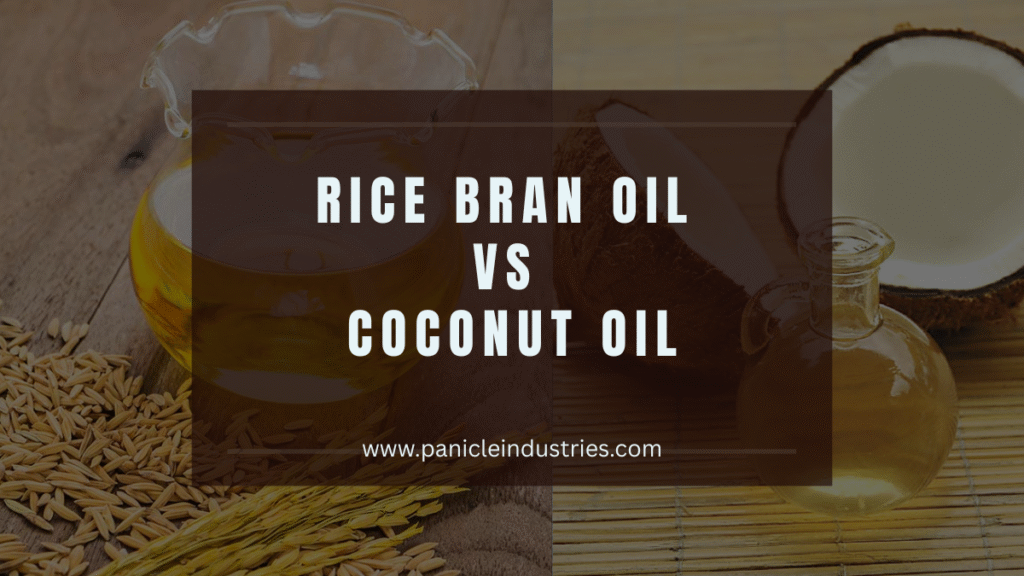Choosing the right cooking oil can be confusing because there are so many options in the market. Two popular choices are rice bran oil and coconut oil. But when it comes to rice bran oil vs coconut oil, which one is better for cooking and health? Both have their own benefits and uses. Some people like coconut oil for its taste and skin benefits, while others prefer rice bran oil for its light texture and heart-friendly qualities.
In this blog, we’ll explain the differences between rice bran oil vs coconut oil in simple words. You’ll learn about their health effects, cooking uses, and which one might be the best for your needs.
What is Rice Bran Oil?
Rice bran oil is made from the outer layer of rice grains. This outer layer is called “bran,” and it is full of healthy nutrients. The oil is light in color and has a neutral taste, which means it doesn’t affect the flavor of your food too much.
Rice bran oil is popular in countries like Japan, India, and Thailand. It has a high smoke point, which makes it great for deep frying and high-heat cooking. The smoke point is the temperature at which the oil starts to burn and release smoke. Oils with high smoke points are safer and better for cooking at high heat.
What is Coconut Oil?
Coconut oil is made by pressing oil from the meat of mature coconuts. It has a sweet smell and a strong coconut flavor. Coconut oil becomes solid at room temperature, especially in cooler climates. It melts when heated.
There are two main types of coconut oil:
- Virgin coconut oil – made without chemicals, has a strong coconut smell and flavor.
- Refined coconut oil – processed and more neutral in taste.
Coconut oil is used in cooking, baking, skin care, and even hair care. It is rich in saturated fats, which makes it very stable and long-lasting.
Also read: What Type of Rice for Risotto?
Nutritional Comparison: Rice Bran Oil vs Coconut Oil
Let’s look at the basic nutrition differences between rice bran oil and coconut oil.
Rice Bran Oil:
- Rich in monounsaturated fats (MUFA) and polyunsaturated fats (PUFA).
- Contains a compound called oryzanol, which helps lower cholesterol.
- Has Vitamin E, which is good for skin and overall health.
- Low in saturated fat.
Coconut Oil:
- Contains mostly saturated fats (about 90%).
- Has medium-chain triglycerides (MCTs), which are believed to boost energy and metabolism.
- Also has Vitamin E, but in smaller amounts.
- Stable and doesn’t go bad quickly.
If you’re trying to lower cholesterol or take care of your heart, rice bran oil may be a better choice because it has less saturated fat and more heart-friendly fats.
Which Oil is Better for Cooking?
When choosing oil for cooking, think about what kind of food you’re making and how hot your pan will get.
Rice Bran Oil for Cooking:
- Neutral taste, good for stir-fry, deep frying, and sautéing.
- Doesn’t change the flavor of food.
- Smoke point around 450°F (232°C) – very high.
- Perfect for daily Indian cooking, fried snacks, and curries.
Coconut Oil for Cooking:
- Strong coconut flavor, good for certain dishes like Thai curries or South Indian food.
- Smoke point around 350°F (177°C) for virgin coconut oil.
- Best for light sautéing, baking, or dishes where coconut flavor is welcome.
- Not ideal for deep frying.
So in the rice bran oil vs coconut oil debate for cooking, rice bran oil is better for high-heat cooking, while coconut oil is good for medium heat and dishes with tropical flavors.
Health Benefits of Rice Bran Oil
- Heart Health: Rice bran oil may help lower cholesterol levels because of a compound called oryzanol. This is good for heart health.
- Weight Management: Because it is light and not greasy, it helps in reducing fat intake in food.
- Rich in Antioxidants: It contains Vitamin E and other antioxidants that help protect the body from damage.
- Good for Skin: Its Vitamin E content can also help keep your skin soft and healthy.
Health Benefits of Coconut Oil
- Boosts Energy: MCTs in coconut oil are quickly used by the body for energy.
- Helps Skin and Hair: Coconut oil is very popular in beauty care. It moisturizes skin and helps reduce dandruff in hair.
- Antibacterial Properties: It has natural properties that fight bacteria and fungus.
- Supports Digestion: Some people find that coconut oil helps in improving digestion and gut health.
However, too much coconut oil can raise bad cholesterol (LDL) because of its high saturated fat content. So it’s better to use it in small amounts.
Taste and Smell: Which One Wins?
- Coconut oil has a strong coconut smell and flavor. If you love the taste of coconut, it’s great. But it can overpower mild dishes.
- Rice bran oil is almost tasteless and odorless. It lets the real flavor of your food shine through.
If you’re cooking for a large family with different taste preferences, rice bran oil is usually a safer choice.
Skin and Beauty Uses
Both oils are also used outside the kitchen:
- Coconut oil is great for dry skin, hair oiling, makeup removal, and homemade scrubs.
- Rice bran oil is used in some skin creams because of its anti-aging effects, but it’s less common in beauty routines.
If you’re looking for a more versatile oil for beauty, coconut oil wins this round.
Which Oil is More Affordable and Easy to Find?
- In many countries, rice bran oil is slightly cheaper and easily available in supermarkets.
- Coconut oil, especially virgin types, may cost more, especially the organic ones.
But both are widely available these days. You can choose based on your cooking style, health needs, and taste.
So, Which One Should You Choose?
The answer depends on your lifestyle and health goals.
- Choose rice bran oil if:
- You cook Indian food or deep fry often.
- You want a heart-friendly, light oil.
- You don’t want any strong taste in your food.
- Choose coconut oil if:
- You love the taste of coconut.
- You cook Thai or South Indian dishes.
- You want oil that’s also good for skin and hair.
Or, you can keep both in your kitchen and use them as needed. That way, you get the best of both worlds!
Conclusion
When it comes to rice bran oil vs coconut oil, both have their own strengths. Rice bran oil is light, heart-healthy, and great for high-heat cooking. Coconut oil is rich in flavor, great for skin and hair, and has special fats that give energy. If you want a neutral oil for daily use, rice bran oil is a great choice. If you enjoy coconut taste and want a multi-use oil, go for coconut oil.
There is no one “best” oil—just choose what fits your cooking and health needs. A balanced use of both can make your kitchen healthier and tastier. So pick smart, cook healthy, and enjoy every meal!


